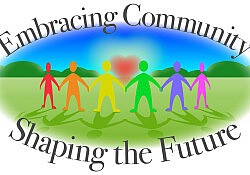Christmas Eve message at UUSS 2019
Posted by Rev Roger
Posted on December 24, 2019
Rev. Dr. Roger Jones
Reading:
Gospel of Luke 2:1-20 (King James Version, 1611) and storyteller Allison’s reprise of it.
Message (Sermon):
And the angel said unto them, Fear not:
for, behold, I bring you good tidings of great joy, which shall be to all people.
For unto you is born this day in the city of David a Savior, which is Christ the Lord.
Many years ago I was talking about sermons with a friend from Ireland who was a Catholic Franciscan priest. We got on to the topic of the sermons on the big moments in the church calendar—Easter and Christmas. He told me that whatever else goes into a sermon on those holidays, people are expecting to receive a specific message. For Easter, it’s a message of hope, he said. And on Christmas, what people need to hear is the message that we are loved. Considering the complicated Christmas holiday season, that does make sense. We need the reminder of love, and the reminder to love.
The season can bring stress. When we are little, it may be the stress of anticipation—that is, waiting for the big day to arrive, with reindeer pulling a sleigh with a big jolly man in a red furry suit who brings presents under the cover of night. When we become adults, there are so many things to occupy our minds, distract our attention, and eat up our time. For example—preparing for travel or getting ready to receive guests. Going to parties or special meals or hosting one of them. Reserving space on the calendar for seasonal traditions, like attending a play, a concert, a ballet—or performing in one. The task of shopping—that is, taking time to buy gifts, special foods, decorations, wrapping paper, and so on.
What complicates these activities is that nearly everybody is doing them at the same time. December is a deadline, and most of us are procrastinators. Yet perhaps this deadline is what it takes for us to remember to tell others how much they mean to us. Christmas is a nudge, a reminder of the connections we have, the memories we’ve created, and our many reasons for gratitude.
It’s a time of goodwill toward all people, even those we don’t know. For example, when we sit in an audience at a theater, auditorium, or concert hall, we surround ourselves with people who are mostly strangers. That shared experience is more intense than a solitary one. It’s different from watching the same thing on television or streaming it online. This is the holiday spirit at work.
Furthermore, at this time of year, North Americans donate a lot more money and food than we do in other seasons. Some people even make time to volunteer a bit more than usual. We tip more generously.
We squeeze so many efforts and so much enthusiasm into the same time of year. It seems that we trust that everybody else has the same good intentions, the same generosity of spirit as we do. Perhaps we feel more affection for humanity, more warmth for one another, more faith in our human siblings at this time of year.
For the point of Christmas is not only that we are loved. The point of Christmas is also that we are capable of more love than we had thought. More kindness and generosity than we had thought to show, several months earlier. More compassion and patience than we were able to practice in ordinary time on the calendar.
All these good, warm feelings emerge in the midst of this cold season. We long to see the divine spark in perfect strangers when sitting in a concert or rolling by the neighborhood Christmas lights.
For me these warm feelings last all the way until my car is the fourth one lined up for a non-existent parking space in the parking lot at the Food Co-Op, Costco, or God forbid—Trader Joe’s. When congested roads keep me from rushing as fast as my to-do list urges me to rush, I don’t feel so connected to all those people behind the wheel of every other car. They—those people—are blocking my way, keeping me from doing what needs to be done to show the love, joy and peace that Christmas is all about!
When I’m in line at the Post Office, I get very judgmental about my fellow human beings. They are the people who planned even worse than I did for mailing packages or buying stamps. My warm fuzzies turn into hot-under-the-collar frustration.
That sort of describes my attitude, just about a week ago. At the very busy Post Office on Arden Way, I am in a long line, waiting with other holiday procrastinators. I’m holding boxes to ship across the country, and I need stamps. Those other people and I crowd in the waiting area just as we might in the lobby of a concert hall at intermission. But here, it’s not so jolly.
How long will I have to wait?
Who will annoy me by taking too long at the window?
Will the clerk at the window be surly, mumble at me, or sigh when I ask a stupid question? [sigh!]
Then, as I wait, a younger man in front of me asks a question of me. His accent indicates he didn’t grow up in California. Perhaps he’s from one of the refugee or immigrant families who are making a home and a life for themselves in the neighborhood of the post office, which is also the neighborhood of our congregation.
Innocently, he asks me: “Excuse me, can I buy stamps in this line?”
Yes, I reply. But there’s a machine out there you could also use, depending on how many stamps you need.
He asks another easy question and I answer. “Thank you so much,” he says. I hear him go up and make his purchase, and then I hear the postal clerk telling him directions to an office supply store, for envelopes. On his way out he looks at me. Again he says: “Thank you.”
Now a different Post Office clerk is making her way down the line, asking each person what we need. “Do you have any questions?” she asks, with a kind smile. Shorter than I am, she’s dressed up in a two piece suit of light green felt, with a shiny red necklace. Her green cap has silver bells jingling on it. I never knew the Post Office had an elf! She answers my questions helpfully. I’m still waiting in line, but it seems to take less time than I feared. And the clerk who calls me to the window is cheerful, not gruff. She doesn’t mumble, and she even makes a joke.
I go out to my car and get in. Though I still have more chores to do than I have time available, I am surprised with feelings of warmth and, yes, good will. I take a deep inhale breath, and let it out. Arden Way, a four-lane road, is congested this afternoon, of course. I need to merge onto it and move over two lanes to make a left turn. Several cars pass before one driver pauses to let me in. It’s okay! I don’t need to feel in more of a hurry right now. In the midst of doing too much, maybe I can receive the surprising Christmas message—we are loved. Maybe I can re-learn the lesson of Christmas and practice it—the lesson that we are more capable of love than we had believed. We can show more kindness, generosity, patience, and compassion than we had come to think.
It occurs to me that perhaps that angel spoke to the shepherds in the field because the shepherds were the ones who were not too busy to hear the news. They were tending their flocks in the field by night. Guarding the sheep was a lonely and thankless task, but a necessary one. Poor, humble shepherds. The angel must have decided to tell shepherds the good news because they might be ready to hear it. Good news about the power of love in the world, glad tidings about the promise of new life. Even though they were occupied in the fields, the message of love was too powerful to ignore. Their need for the message drew them out of their fields. It called them out of their routines and toward something surprising and special.
If we read Luke’s Gospel closely, we notice that the angel did not say “I bring good news,” but “I bring good news to you!” Not the news that a savior is born, but a savior is born to you, the angel says. Good news of a great joy which is for all the people—that’s how it reads. All the people. In other words, even you, even me, even us. And most of all, even them, whoever anybody might reject or write off as “them.” For, in this story’s moment of angelic surprise, nobody is them. Everybody is YOU.
This is what draws the shepherds near to the baby in the manger. This is what draws us into the stable in Bethlehem. We crowd in with the farm animals who find shelter there. We get close to the other human visitors, too—the folks coming from faraway places and wearing strange outfits.
In the story’s moment of surprise, nobody is them. Everybody is YOU. This is what draws us together here on this holy night. May the warmth and light of this holy night stay with us as long as possible so that we might behold everyone as YOU.
This is the Christmas lesson. When we are feeling frustrated or when we’re doubting ourselves, let us remember that we are loved, and we are capable of love.
When our short temper gets shorter, or when we are grasping or grumbling too much for our own well-being, may we treat ourselves, and others, with more compassion and patience.
In the days and months to come, may the warmth and light of this holy night show up and surprise us in our lives. So may it be. Amen.




Sorry, the comment form is closed at this time.